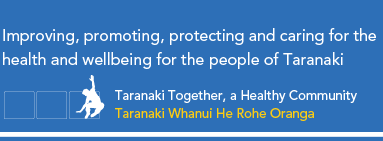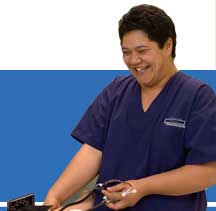WHOOPING COUGH (Pertussis)
17 February 2009
After three confirmed cases of whooping cough in Taranaki, Taranaki DHB Medical Officer of Health Dr Penny Hutchinson is asking the community to be aware of the possible signs.
“Whooping cough (or pertussis) is a highly contagious illness that is caused by bacteria. It can affect babies, children and adults, but it can be very serious (one in four children develops pneumonia) and even life threatening in children under 12 months of age.”
Dr Hutchinson said. “It may start like a cold, with a runny nose and sneezing, and then the characteristic cough develops. These coughing bouts can be very severe and frightening, and may end with a crowing noise (the whoop) or vomiting.”
Treatment is usually a seven-day course of antibiotics which reduce the time a person is infectious to others. Antibiotics need to be given within 21 days of the start of general symptoms or within 14 days of the start of the cough.
“A person with whooping cough should stay away from work, school and child care until they have had five days of a seven-day course of antibiotics, or until 14 days after the start of the coughing, which ever comes first,” said Dr Hutchinson.
Whooping cough can be prevented by vaccination, and Dr Hutchinson urges all parents to make sure that their children are fully immunised and if not to see their health practitioner about completing the course of vaccinations.
The vaccine is recommended and provided free for all babies at 6 weeks, 3 and 5 months of age with a booster at 4 years of age.
As protection from the whooping cough vaccination gradually reduces over time, a booster dose, which comes combined with diphtheria and tetanus vaccine (dTpa), is now provided to children at 11 years of age. It is also recommended that older adolescence and adults, particularly those who have contact with very small children such as new parents, child-care workers and health care workers, also have the whooping cough booster.
For further information on whooping cough or whooping cough vaccination please contact your local doctor, your Public Health Nurse or the Taranaki DHB Public Health Unit.
Fact Sheet
How is whooping cough spread?
The bacteria is spread by an infected person coughing or sneezing. Direct contact with infected secretions from the mouth and nose can also pass on the infection.
How long does it take to show symptoms (get ill) after being in contact with an infectious person with whooping cough?
After exposure to the bacteria, it usually takes nine to ten days to become ill.
How long will it last?
The coughing may last from a few weeks to 2-3 months.
Public Health Fact Sheets
How likely are you to be affected?
Whooping cough mainly occurs in childhood but cases can occur in all age groups. One attack of the disease usually produces long-term immunity, though second attacks in the same individual have occurred.
How long is whooping cough infectious?
A person is highly infectious for the first two weeks of their cough. This gradually decreases in the third week, although coughing may last up to three months.
How is it diagnosed?
If a doctor thinks that someone has whooping cough, a swab from the back of the nose, or a blood test may be done to help confirm the diagnosis.
Do people who come in contact with whooping cough require treatment?
No, not all people need treatment. However, because infants are at a higher risk of severe complications if they develop whooping cough, a seven-day course of antibiotics is recommended for the following people in the same house as a person with whooping cough (if the infected person has been coughing less than 14 days):
- Any baby less than 12 months of age regardless of their vaccination status
- Any child between 12-24 months of age who has received less than three doses of a whooping cough vaccine
- Any woman in the last month of pregnancy
- Any child or adult who attends or works in a childcare centre.
Household contacts, who have received less than three doses of whooping cough vaccine, should be excluded from child care centres until they have taken five days of the seven-day course of antibiotics or the 21 days after the last exposure to infection.
A single booster dose of dTpa is recommended and provided free for:
- Adolescents at 11 years of age
A single booster dose of dTpa is recommended, but not funded for:
- Adolescents at 15 to 17 years replacing the dose of ADT (dT)
- For both partners planning pregnancy, or for both parents as soon as possible after delivery of an infant
- Adults working with young children especially health care and child care workers
- Any adult requesting a booster dose of dTpa, provided they have received three previous doses of DTP
- May be used instead of ADT vaccine at 50 years of age.
For more information, please contact:
Sue Carrington
Taranaki DHB Media Adviser
Ph. 021 367 78



